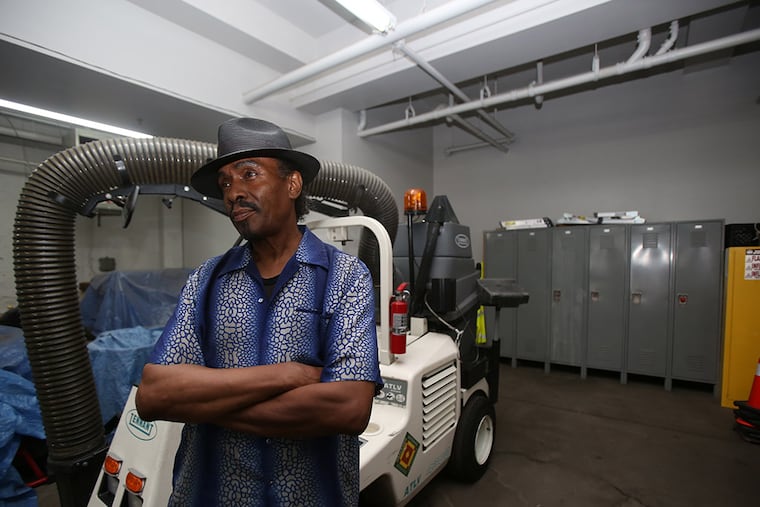Kenney: Bring back city-funded street sweeping, add 'South Philly edge' to anti-litter campaign
Mayoral candidate Jim Kenney wants to bring regular street cleaning back to Philadelphia — if neighbors say OK.

Mayoral candidate Jim Kenney wants to bring regular street cleaning back to Philadelphia — if neighbors say OK.
In an interview earlier this month, Kenney said he still remembers when the city abandoned the last vestiges of its decades-old street cleaning program, in the early 2000s, largely over parking complaints.
He now believes that was a mistake.
"They do [street cleaning] once a week in Manhattan, and parking is no easier there than it is in South Philadelphia," he said. "I can't see why everybody should suffer as a result of the selfishness of some people that just don't want to move their cars for a couple hours one day a week."
In that interview, Kenney said he would like to revive the lost municipal service if elected, but with a caveat.
"We'd have to have more neighborhood input and have people buy into and maybe just clean the streets where people are willing to move their cars," he said.
If neighbors wanted the service, they'd get it. If not, their neighborhood would stay dirty.
"It's sad that we have to spend resources cleaning up after people. We could be putting that money into schools and other services. It is what it is, but we still have a responsibility to make the city clean," said Kenney.
His campaign later affirmed the candidate's plan for optional street sweeping, adding that they were in the "process of exploring how that could be realized."
"[Kenney] believes that communities who want street sweeping and who are willing to move their cars should be able to access that resource," wrote campaign spokesperson Lauren Hitt in an email. "Those neighborhoods should not lose out entirely because some communities value street parking over street sweeping. Every community's needs and priorities are different, and Jim wants to respect that when it comes to littering and other everyday violations."
Melissa Murray Bailey, the Republican candidate for mayor, says she cleans up the area around her neighborhood's school building with her four-year-old daughter. She says she also supports a return to regular street cleaning.
Despite the Streets Department's apparent determination to cut down on public trash cans, Bailey said she wanted more of the ubiquitous Big Bellies deployed around the city. In addition to beefing up sanitation ticketing, Bailey said she also wanted to prohibit "from dropping paper menus and advertising anywhere outside."
The Streets Department has estimated that twice monthly street cleaning could be reintroduced with $18 million in startup money and $3.5 million in annual operating costs. Although not an insignificant expense in a cash-strapped city, it's also not an unreachable fiscal goal — city administrators and pols helped gather about $18 million in federal, state, and local funding to construct the Schuylkill Banks boardwalk.
Community leaders were generally enthusiastic about the prospect of renewed municipal street cleaning — although some were opposed to the idea of making basic sanitation services a choice.
"Citywide street sweeping should be brought back, but it should be mandatory," said Sam Sherman, the head of the Passyunk Avenue Revitalization Corp., which spends much of its budget on street cleaning in South Philly. "Just like maintaining your sidewalk is mandatory, just like paying your property taxes is mandatory."
Sherman, whose group The Next Mayor profiled in a recent examination of the city's litter epidemic, acknowledged that there were certain residents who would "go crazy" if the city tried to reintroduce street cleaning because they didn't want to move their cars. But he said that these individuals were also more likely to show up to community meetings about reintroducing the service and shouldn't be allowed to prevent the city from cleaning up litter at the expense of others.
Sherman said there was a simple solution for dealing with these complaints.
"It's called 'leadership,'" he said. "This is for the greater good of the city. Moving your car is probably the least you could do for the city."
In addition to outlining his street cleaning plan, Kenney also said he would like to refashion the city's unpopular "UnLitter Us" ad campaign. That program combines slam poetry with anti-littering public service announcements.
He said he'd like to see those ads, paid for with a state recycling education grant, reworked with "a little South Philly edge."
"We need a more robust kind of direct, in-your-face advertising effort. Some of the stuff that was done for public service spots was a little on the softer side," he said, referring to UnLitter Us. "I'm not a TV commercials producer or director, but I have a couple ideas of how to get people's attention."